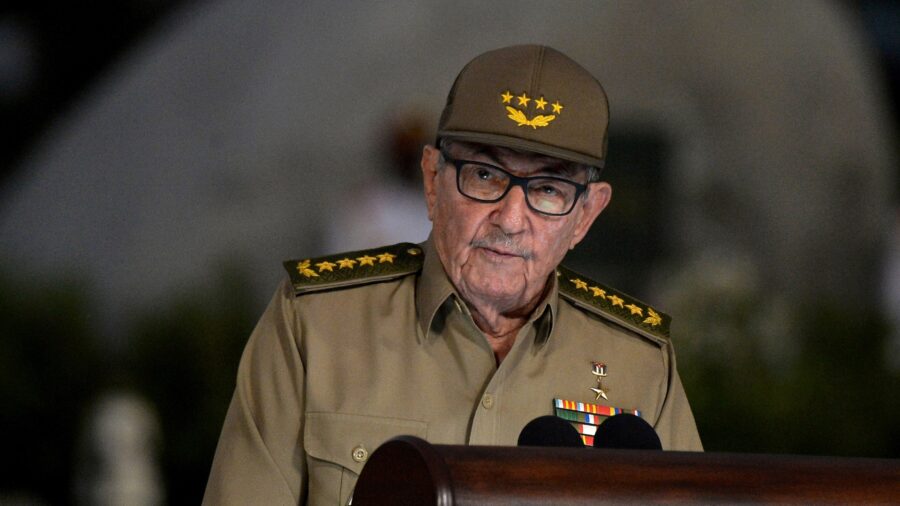HAVANA—Raul Castro confirmed he was handing over the leadership of the Cuban Communist Party to a younger generation at its congress that kicked off on Friday, ending six decades of rule by himself and older brother Fidel.
In a speech opening the four-day event, Castro, 89, said the new leadership were party loyalists with decades of experience working their way up the ranks and were “full of passion and anti-imperialist spirit.”
Castro had said at the last party congress in 2016 it would be the last one led by the “historic generation” who fought in the Sierra Maestra to topple a U.S.-backed dictator in the 1959 leftist revolution. He already handed over the presidency to protege Miguel Diaz-Canel, 60, in 2018.
The congress is the party’s most important meeting, held every five years to review policy and fix leadership.
“I believe fervently in the strength and exemplary nature and comprehension of my compatriots, and as long as I live I will be ready with my foot in the stirrups to defend the fatherland, the revolution and socialism,” Castro told hundreds of party delegates gathered at a convention center in Havana.
The congress is a closed-door event but excerpts are being broadcast on state television.
Castro, who launched a raft of social and economic reforms to open up Cuba after inheriting the leadership from Fidel in 2008, hailed Diaz-Canel as one of the new generation of leaders.
Castro’s olive green military fatigues contrasted with the civil get-up of his protege, who is widely expected to succeed him as party first secretary, the most powerful position in Cuba’s one-party system.
Older Cubans said they would miss having a Castro at the helm, although most acknowledged it was time to pass on the baton.
“It’s another stage,” said Maria del Carmen Jimenez, a 72-year old retired nurse, “but without a doubt we will miss him.”
Castro denounced renewed U.S. hostility under former President Donald Trump. Incumbent President Joe Biden has vowed to roll back some of Trump’s sanctions, although the White House said on Friday a shift in Cuba policy was not among his top foreign policy priorities.
Castro said Cuba was ready for a “new type of relationship with the United States without… Cuba having to renounce the principles of the revolution and socialism.”
Pressure to Reform
Cuba’s new leaders face the worst economic crisis since the collapse of former benefactor the Soviet Union, while there are signs of growing frustration, especially among younger Cubans.
A tightening of the decades-old U.S. trade embargo and the coronavirus pandemic have exacerbated a liquidity crisis in the ailing centrally planned economy, which was already struggling following a decline in Venezuelan aid.
That has led to shortages of even basic goods, with many Cubans spending hours lining up to buy groceries.
Those problems are foremost on citizens’ minds, especially younger Cubans who have known only crisis, analysts said.
“I wish for a better future without so many internal and external restrictions,” said Havana resident Guillermo Estrada, 31.
Since the expansion of internet access in recent years, Cubans are increasingly using social media as a platform to express criticism, while online non-state media are challenging the state monopoly of mass media.
Tight control of public spaces by the authorities means protests are still relatively rare and small-scale, but they are on the increase nationwide.
The dire economic situation has pushed the government to speed up the implementation of reforms first agreed by the party in 2011. A monetary overhaul this year sent inflation soaring four or fivefold, according to economists.
Havana has dollarized parts of the economy, leaving those who do not receive remittances from family abroad or who did not earn hard currency from tourism struggling to get by. That has eaten away at equality, a pillar of the party’s legitimacy.
Castro said on Friday it was important to speed up reforms, denouncing—as he has in the past—”inertia, conformism, the lack of initiative” in state companies.
Yet he said reforms fomenting the non-state sector should not go beyond certain limits that would lead to the “very destruction of socialism and the end of national sovereignty.”
Party militants like Rogelio Machado, a mathematics teacher, say they were confident the new generation was up to walking that tricky tightrope.
“Our country need changes and the new generation is more scientifically prepared to continue the path of socialism,” he said.
But government critics like “artivist” Luis Manuel Otero Alcantara, whom Havana accuses of being part of a U.S.-backed soft coup attempt, say the death knell is sounding for the revolution.
“Raul is passing over the power to someone with little charisma and who does not have much popular support,” he said while staging his latest performance against the government, in which he sits in a garrote for the four days of the congress. “This takes us one step closer to democracy.”
By Sarah Marsh and Nelson Acosta


